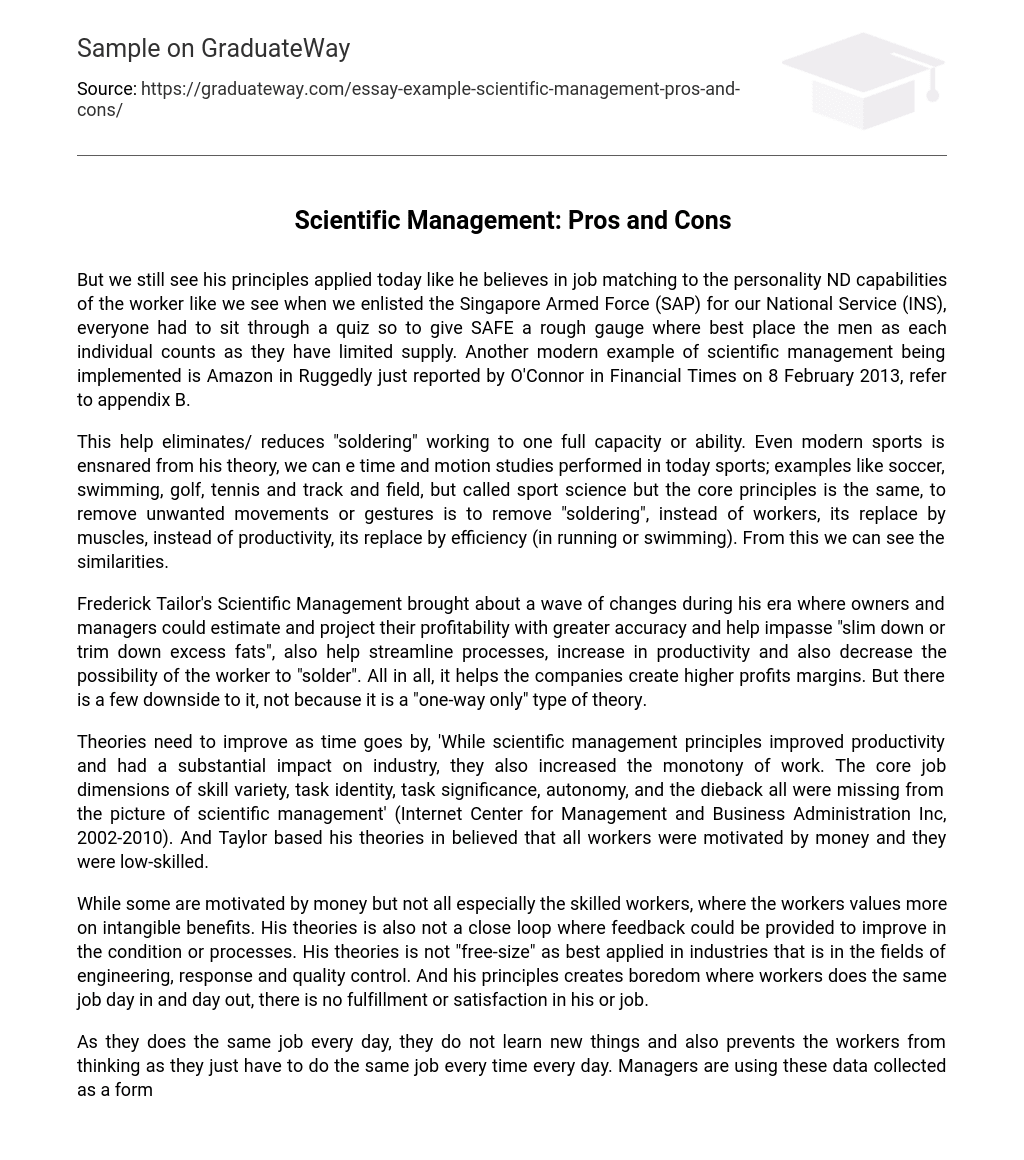But we still see his principles applied today like he believes in job matching to the personality ND capabilities of the worker like we see when we enlisted the Singapore Armed Force (SAP) for our National Service (INS), everyone had to sit through a quiz so to give SAFE a rough gauge where best place the men as each individual counts as they have limited supply. Another modern example of scientific management being implemented is Amazon in Ruggedly just reported by O’Connor in Financial Times on 8 February 2013, refer to appendix B.
This help eliminates/ reduces “soldering” working to one full capacity or ability. Even modern sports is ensnared from his theory, we can e time and motion studies performed in today sports; examples like soccer, swimming, golf, tennis and track and field, but called sport science but the core principles is the same, to remove unwanted movements or gestures is to remove “soldering”, instead of workers, its replace by muscles, instead of productivity, its replace by efficiency (in running or swimming). From this we can see the similarities.
Frederick Tailor’s Scientific Management brought about a wave of changes during his era where owners and managers could estimate and project their profitability with greater accuracy and help impasse “slim down or trim down excess fats”, also help streamline processes, increase in productivity and also decrease the possibility of the worker to “solder”. All in all, it helps the companies create higher profits margins. But there is a few downside to it, not because it is a “one-way only” type of theory.
Theories need to improve as time goes by, ‘While scientific management principles improved productivity and had a substantial impact on industry, they also increased the monotony of work. The core job dimensions of skill variety, task identity, task significance, autonomy, and the dieback all were missing from the picture of scientific management’ (Internet Center for Management and Business Administration Inc, 2002-2010). And Taylor based his theories in believed that all workers were motivated by money and they were low-skilled.
While some are motivated by money but not all especially the skilled workers, where the workers values more on intangible benefits. His theories is also not a close loop where feedback could be provided to improve in the condition or processes. His theories is not “free-size” as best applied in industries that is in the fields of engineering, response and quality control. And his principles creates boredom where workers does the same job day in and day out, there is no fulfillment or satisfaction in his or job.
As they does the same job every day, they do not learn new things and also prevents the workers from thinking as they just have to do the same job every time every day. Managers are using these data collected as a form of personal performance indicator to prove whether a worker is productive or not. While there is two-side of it, it may keep the workers on the toes to keep working or a worker just maintaining the pace ND not to “spoil” market as they are paid the equal amount whether if they did more, it does not really gives the workers incentive to work harder or more or better.
Also it by not giving the joy or pride in his work, slowly the tendency of the quality of the product drops as quantity doesn’t equal quality. Even Weber warn if it is used to extreme,’ By it the performance of each individual work is mathematically measured, each man becomes a little cog in the machine and aware of this, his one preoccupation is whether he can become a bigger cog’ (Weber, 1909).
To address this issue, Japan came out tit another type of management style called Total Quality Management (TTS), popularized by Edwards Deeming(1986) while keeping the essences of Scientific Management, it allows to have feedback channels to the management and the management have to address all the feedbacks to allow the workers to feel appreciated and therefore takes pride in their job bringing more quality products and less spoiled products that may not be TABLE to be recycled In turn racking less lost in producing one product. Which decrease the production cost.
Henry Payola also came out his own 14 principles which is ore influence by his job experience hence there is more human touch to it but it also lack the feedback and his theory is more of a overview on how a company should run rather than how should a manager work. In all, feel that Scientific Management brings more benefits to the owners or shareholders of the company than to the workers that are working in the company, as feel that workers are the people who build the companies, without them no companies can survive, to me it’s more essential the happiness of the workers than the profit margin of the company.
The ideal scenario is where the company looks after the interest or welfare of their workers and the workers looks after the company’s interest, where both side wins. It’s the company lost if they fail to retain staffs as the company spent time and money to educate and teach and along the way the staffs experiences which may not be replaceTABLE as they thought and they have to spend even more money and time to re-teach a newcomer. While it is being improved over the years, the essence of it is still true and good best used by a good management team who can balance the profitability and happiness of the workers.





